







 |
 |
 |
 |
 |
 |
 |
 |
--Caesar Godzillatron
1. He can change, create and destroy universes.

At least twice he created an entire universe (in Heroes Reborn
and also in Hickman's run).
The two facts are closely related, and provide an in-comics explanation for everything.
Franklin's origin story depends on Annihilus' Cosmic Control Rod:
Like the rod, Franklin manipulates matter and energy.
Like the rod, Franklin retards the ageing process.
Everything else is details. But the details are interesting, so here we go:
Like modern Marvel, Franklin was born in 1968.
Like modern Marvel, Franklin fears change.
Like modern Marvel, Franklin has the power to stop it.
Like modern Marvel, Franklin unconsciously created Marvel Time.
Back in 1973 (FF141) Franklin was spoken of as having galaxies at his feet. In 1979 (FF216) it was predicted that the world would be too small for him.

After FF244 dampers were placed on his mind to close of his power (with disastrous results - see FF251). But how was that early power manifest? Franklin's simplest power is to create a dream version of himself (as seen in Power Pack). His greatest (usually unconscious) power is to create a kind of dream version of all reality, as we saw in Heroes Reborn.
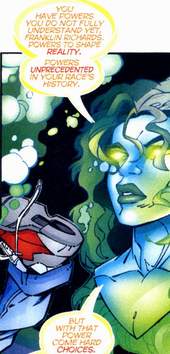

Franklin does not need to be conscious to exert this power, as we saw when he defeated Ultron in FF 150. His brain had been shut down months before, and he was still in a coma, but this did not stop him defeating Ultron. And in the famous case of Heroes Reborn, Franklin was only dimly aware that he had created an entire pocket universe, moved the heroes into it, and retconned their entire lives.
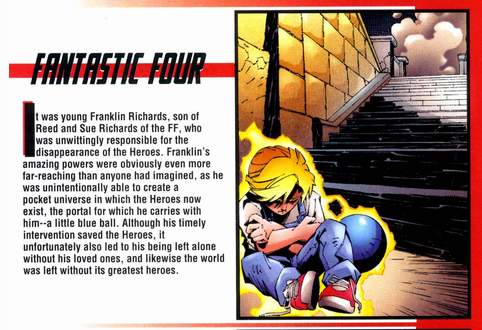
Franklin did it again with Doom's world (see Doom: The Emperor
Returns, issue 1 of 3). Franklin was unconsciously controlling an
entire world, via a ghostly avatar, while he (physical Franklin)
was back at home being a kid as usual.
Note the parallels between Franklin's universe globes (see in heroes Reborn and again in Hickman's run) and the snow globe at the end of TV's "St Elsewhere". The entire universe exists in the mind of a child. Although the first appearance of Franklin globe post-dates the last episode of St Elsewhere, Franklin's power was already clear in the 1970s (circa FF140) and note the similar child in FF203.
The case against the Tommy Westphall hypothesis and also the Franklin hypothesis is that both universes contained adult themes that a child would not understand. However, a person does not have to understand something in order to create it: he simply plants seeds and then sees them evolve in ways he never expected or wanted. This just reinforces Franklin's fear of change (see below).
I'm not sure I would use the phrase "not really real" but I agree with Reverend Meteor that Valeria's origin was down to Franklin, and unconsciously it's part of his plan.
He did the same trick again when faced with Abraxas. Only this time he saw that his Mommy was seriously scared, so he acted consciously. For those who missed the stories, Abraxas had enough power to end all existence. He had already killed Galactus on numerous different realities, just to show what he could do. In Fantastic Four volume 3 number 49 he is defeated by Franklin Richards. Franklin sees that his Mom is scared, so he decides to fix the situation. He does. Exactly what happened is a bit confusing, but it involves summoning Eternity, and Galactus, and using the Ultimate Nullifier. Big stuff.
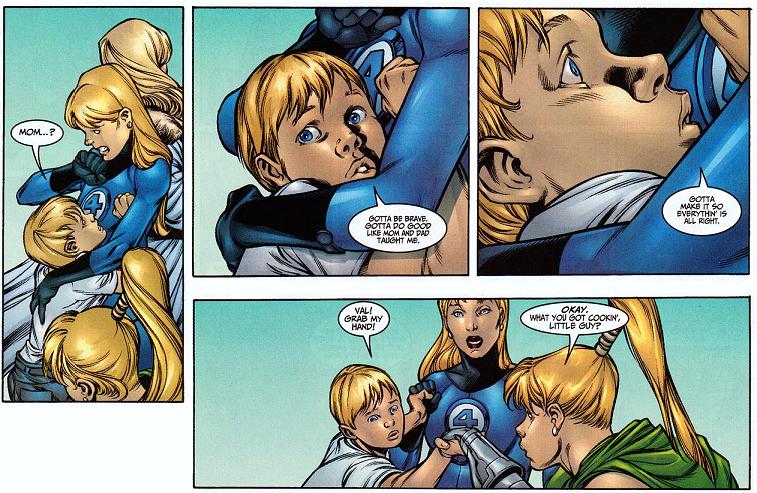
Why doesn't Franklin fix everything? D'uh. He does. Franklin is why heroes never die, and if they see to die then they come back. This did not happen before he was born. His grandfather, after whom his is named, died and never came back. This had a devastating effect on Franklin's mother, Sue. So as Franklin grew up, as he became more aware of the world, you will notice that fewer and fewer characters die, and if they do they stay dead for shorter and shorter periods.
How powerful is Franklin? Beyond omega. Basically, the most powerful human in the Marvel Universe. Franklin is a galactic constant, like Galactus, Eternity, etc.

Galactus is his herald (see FF603-4)

For more about Galactus as the herald of Franklin, see the discussion by FF74.
Mephisto is powerless before Franklin. Mephisto is a being so powerful he can change the entire world at a whim (Brand New Day). He is so abstract that even if annihilated he will always come back. But Mephisto is afraid of Franklin. When he once had Franklin in Hell (circa FF 270), his only hope was to keep Franklin asleep and encased in mystic crystal. To defeat Mephisto, all Dr Strange had to do was make Franklin aware of Mephisto's presence. There was not even a battle.
In FF408 and later, we see that Hyperstorm inherits his hyper-powers from Sue, through Franklin. He draws energy from the source of all forces (electromagnetic, gravitational, weak, strong, etc.) - i.e. he directly taps into the energy from which the universe emerged. He's kind of above and beyond everything else.

The story of the Fantastic Four is the story of learning to put Franklin first. The story reaches its climax and conclusion when Reed finally accepts what Sue has been telling him. The Franklinverse story reaches a climax in the same way, in FF604.
The next generation of the FF, led by Johnny, would inevitably include Franklin, but that is another story. Incidentally, on a serious real world note, this has deep resonance with evolution and the need to focus on the next generation, but I digress.
Reed Richards, the smartest man in the world, the man who defeats Galactus before breakfast, the man who's one desire is to fix everything, does not dare ask Franklin. Reed has two strategies: dampen Franklin's powers in any possible, and make him feel safe.
Sue Richards is the only person who understands Franklin better than Reed, and she knows any attempt to control him is futile (see circa FF 140, where such an attempt almost destroyed their marriage). The only strategy is to love him. Or possibly... Sue's strategy may go deeper than we imagine. The only being with the power to limit Franklin's power is Franklin. All of Sue's actions have the result of making her son psychologically repressed: see the later discussion for details. This
is not a conscious strategy, she does not want to hurt him, but perhaps some instinct kicks in at a deep level. It is a high stakes game. Not just the fate of the universe is at stake.
Ever heard the phrase swatting a fly with a nuclear bomb? That doesn't come close to the madness of asking Franklin to consciously intervene. Not even close. You just don't do it. Are you insane?? The one time that Franklin used a significant amount of power deliberately (getting his Dad to use the Ultimate Nullifier), it involved THE ULTIMATE NULLIFIER!!! You do not mess with the ultimate nullifier. Franklin is a young child; one mistake and he could erase EVERYTHING. You want to bring Johnny back faster than Franklin would do it naturally? U-oh, just accidentally destroyed the space time continuum. Whoops. The only being mad enough to try to control Franklin was Annihilus (see circa FF 140). Annihilus has an insect brain, desires to annihilate (as his name suggests), and would not mind if both our dimension and his were destroyed. Try to extract power from Franklin? No. No no no no no no no no no no no no no.
I must stress again that Franklin has very limited conscious control over his power, and he uses childish logic. Nomadic Writer puts it better than I could:
So it's entirely possible he already has saved Johnny, but
whatever fix he came up with has to follow little kid daydream
logic and fit in with events as they already happened, rather than
Johnny just popping up all, "Nope, not dead, never was."
Basically, if/when Johnny ever comes back to life, whatever
convoluted explanation the comics give, that was the story that
Franklin dreamed up to explain how he could have survived.
Why is Franklin so powerful? Because his mother can make force fields and his father can stretch? That makes no sense. What is the real origin of his powers?
For the answer we must go back to FF Annual 6, the birth of Franklin Richards. We see right at the start that Reed and Sue do not give their son superpowers: they give him a deadly radiation cancer that threatens to kill both mother and baby! And they need a particular element from the Negative Zone to save them.
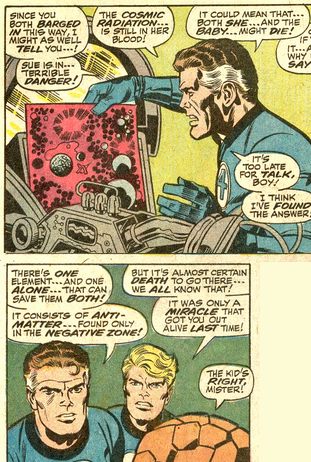
Reed used Annihilus' Cosmic Control Rod to save his wife and baby, allowing Franklin to be born. The Cosmic Control Rod has vast power that can be shaped by the user's mind. And it specifically gives immortality, as Annihilus reminds us on many occasions.
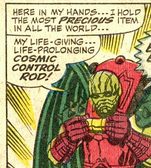
What do we know about the Negative Zone? It first appeared in FF51, described as a dimension that connects all parts of our universe, allowing Galactus and the Silver Surfer to travel faster than light. (It is no coincidence that Franklin has a special connection with Lockjaw and Puppy, the dimensional travelers.)
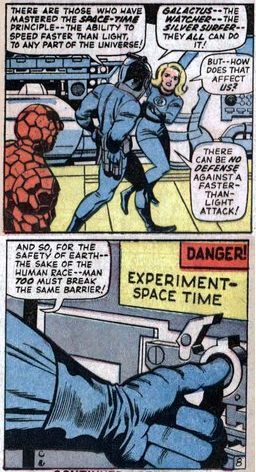
It was explained in FF annual 6 that combining even a tiny amount of the positive and negative universes would release vast amounts of energy. In other words, this is Einstein territory. E=mc2 Anyone who truly masters the Negative Zone can master time, space, and energy.
It is often noted that Reeds real power is his brain: he can stretch around any idea, and physical stretching simply makes this easier. In the best stories he is often stretching in his lab or shrinking to explore the insides of machinery. As for Sue, she has barely begun to harness or understand her power. At first it seemed to be just invisibility, then she realized she could create force fields. She controls an exotic form of energy that can even penetrate and defeat a celestial (see FF 400). In the future she may be able to refine this power to be at the Molecule Man level (see FF 553 or nearby).
So Reed and Sue's real powers are to control power far bigger then themselves. This was passed on to Franklin, in a way that gave him the greatest possible control over e source of all power - see below.
An examination of the FF's origin shows that the "accident" was guided by the Celestials. Those same Celestials who show such respect for Franklin. Remember how Sue's energy allows her to dissipate the solid matter that makes up a Celestial? No accident. The FF are an experiment by the Celestials, and Franklin is the climax of that experiment.
We saw, in the origin and nature of the Negative Zone, that the negative zone is simply sub-space: the place where all the dimensions connect. Anyone who has reads Einstein knows that time and space are different dimensions for the same thing, and one way of looking at reality, the only way to make sense at the extremes, is that everything travels at the speed of light, all distances are zero, and all time is stationary. Heavy stuff. The point is that anyone who could control this would have infinite power. For very large values of "infinity."
I have argued elsewhere that all superpowers come from smart atoms, which derive their power from very limited access to the power cosmic - zero point energy, the energy that can create an entire universe from an atom.
Now we have those building blocks:
So we are ready to look closer at Franklin's real power.
As if proof were needed that Franklin's power is based on the Negative Zone, see the 1998 Fantastic Four annual. It shows us the Real Time Fantastic Four, in a reality where Marvel Time never existed. Everyone is their true chronological age and Franklin has grown up normally. Instead of powers that are unlimited and unconscious, his powers are more controlled (though only barely) and are far easier to understand: Franklin's natural state is as the Zero Man, "a living conduit to the Negative Zone." Zero probably refers to Zero Point energy. But it could also refer to his self image.
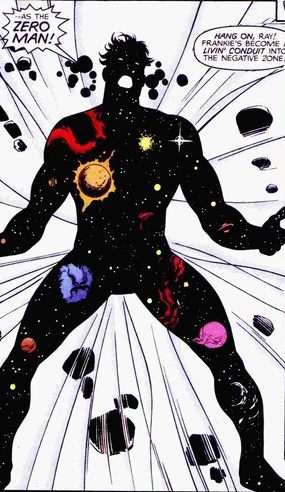
Look at the picture of Franklin, the Zero Man. Remind you of anyone? Yes, it's Eternity, the embodiment of our regular universe.

Franklin's power may appear more limited, but that is not so. Even as a young child, endless galaxies were just toys to Franklin. While Eternity has been seriously challenged in the past, no cosmic being has ever dared challenge Franklin.

Franklin's powers might seem weird. As Zero Man he sucked people into the neg zone. As Psi-Lord he controlled their minds. As a child he could randomly blast people. How do they relate? As shown on the super-science page, all super powers are just efforts to control zero point energy. Franklin appears to have the most random and chaotic powers because he is merely tinkering with powers that nobody comprehends. Imagine a child who gained power to do anything. One day he might order free Pizza. Another day he might blow up the world. But the power is so enormous that he cannot understand what he is doing. If he is to survive for a single day he must learn NOT to try things. If he accidentally finds a power he can control, like zapping minds or sucking people into the negative zone, he uses it. Otherwise he leaves it alone.
The randomness of Franklin's power and his messed up mind are
both proof that he is dealing with the greatest power of all.
Franklin is an editor. He mirrors the real world Marvel editors: if they don't like something they change it, and we blame Franklin. An editor does not actually create anything, he just edits: he cuts and pastes and directs the work of writers and artists. In Franklin's case he just connects threads from alternate realities. Whatever he wants has already happened in some other reality, so he just connects that to ours.
Franklin is not all-powerful. He just appears that way when he
has changed your entire universe. But he does not control the
universe, any more than opening the door to the outside of your
house means you control the outside. Franklin is an above-omega
being who is actually almost powerless. it all depends on your
point of view. The back up stories in FF annual 22 and 23 explain
this really well: the idea of higher and higher powers is largely
an illusion.
When discussing humans and higher powers, humans are most often compared to ants. The classic example is of course Galactus, in FF 50. Galactus comments on destroying the world: "would you hesitate to step on an ant hill?" And after seeing the cosmos, Johnny Storm is overwhelmed. He can only gasp "We're like ants... Just Ants... Ants!!"

The first we see of Franklin as a young child is when he plays on a farm (in FF 135). What does he naturally do when left alone? He watches ants. And "they keep marching round in circles, like they were following orders." From the look on his face, and the comments of his minder, he is just watching them.

To cosmic beings, humans are ants. Franklin is a cosmic-level being. He unconsciously makes ants walk in circles. This is not deliberate, and is certainly not malicious. It is simply how he wants things to be and it is so. As we saw with Heroes Reborn. Critics sometimes observe that Marvel comics can be repetitive, superficial, and lack any real danger. This is exactly what a young child wants from his stories. This panel could be a comic fan (and I am one) distressing that his favorite character has been killed, and wanting him to come back:

So we see that Franklin has virtually unlimited power to control the universe to protect his family when they are in danger, and he often does this unconsciously.
Now the sixty four thousand dollar question: how often are his family in danger? Answer: ALL THE TIME! They are superheroes, they put their lives on the line every day!
Then how often would Franklin feel an unconscious worry about his family? ALL THE TIME!As a young child, whose parents face death every day, what would be Franklin's greatest unconscious fear? The future.
Like any young child he would dislike too much change. Would he simply remove all the bad guys? No. Young children like stories about bad guys being defeated. It makes them feel safe. Franklin would ensure his favorite bad guys keep coming back in order to be defeated again. Young children like their stories to be repetitive.
If all this is true, what would we expect to see in the Marvel Universe? Time slowing down, heroes surviving against the odds, and sometimes even coming back from the dead. The same villains coming back again and again. Occasional moves back in time when things go wrong. In other words, we should expect Franklin to unconsciously create Marvel Time.
Answer: he controls everything
This is pretty much confirmed in FF 284. We learn that Franklin's role (in this case in his Psi Lord persona) is to prevent bad futures from happening.
How Marvel can use Franklin without de-powering him,and without him becoming a deus-ex-machina.
Then how do you think Franklin feels, with the mind of a child but the greatest power of all?
He wants to protect everyone but does not know how, and his slightest error could destroy the universe.
He is the first child born to superheroes. He has no role models, there is no handbook for this. To say that expectations are high is an understatement.
His father is the smartest man on Earth, and his mother never wanted to be a superhero, after raising her brother while her father was in jail for accidentally killing her mother.
The kid has issues.
Most of those issues revolve around his inability to cope with his parents, and their inability to cope with him.
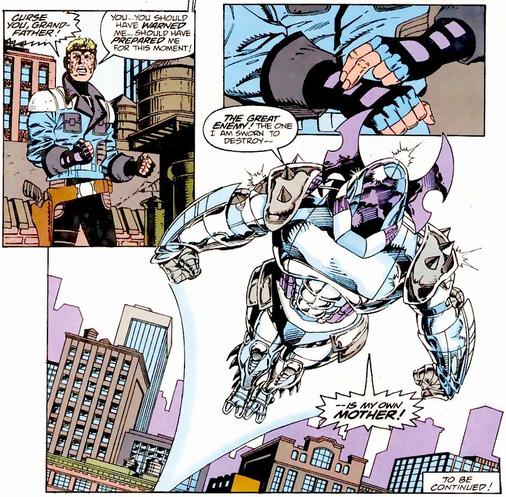
Franklin appeared as a teenager because his father (Reed Richards) was about to disappear in a cataclysm. In FF 375-380 there are various references to this future dystopia. In 380-383 we see that the teenage Franklin has a terrible relationship with his parents. He loves them, especially his mother, but she rejects him. Then Reed is (apparently) killed in front of them both.
Meanwhile In an alternate future, Franklin consummates a relationship, becoming a sexual adult. The result is Hyperstorm, an evil being who threatens to destroy the universe. That future Franklin is then punished by the authorities (the sentinels, the police arm of the anti-mutant state). All very Freudian!
Back in this reality, the central conflict is over destroying and trying to save his family. In issue 1 he explains, "I renounced everything I believed in to come back to this time and save my family from the dark raider." But his grandfather warned it would mean the end of the Fantastic Four. And it turned out the Dark Raider was an alternative reality version of his father (Reed Richards), and the team DID break up!
All this time Franklin is trying to hide. His battle suit completely hides him. He telepathically hides his appearance from everyone (as explained in issue 4). He's doing a job he hates, usually failing, making things worse when he does succeed, and just wants to curl up and hide somewhere, and get back to being a child when his mother loved him.
Franklin tries to replace the Fantastic Four by creating Fantastic Force, with Franklin at its head. He generally feels a failure. Later Reed Richards comes back and resumed his rightful place, and Franklin has to leave. Having failed as a teenager he regresses to being a child once more. He is safe and loved as a child, and apparently intends to keep everything that way forever.
Franklin's deep family insecurities are also revealed in the Zombie universe, where he is killed by a bite from She-Hulk, who replaced his uncle Ben in the FF.
In another universe, Earth-9997, the Earth X reality, Franklin became Galactus. After saving the world he told his father, Reed, and said that he will be Galactus as long as no one tells him that he isn't and that he will never come back. And then he leaves. All he wants is for his Father to tell him to stop, but Reed won't do that.
The kid is never happy. He's in a Freudian nightmare.
For Franklin, the pain never stopped
The entire thirty year run of the Marvel Universe Fantastic Four can be seen as a morality play where Reed must choose to put his son first. The stories that take place after that (from 1991 to the present) are where we see what happens when the Reed makes the wrong decision. Whenever Franklin grows up, his parents reject him, as we see once again in Fantastic Four 574. They don't know it's him, but even when they do know (as when he was Psi Lord) his mother won't believe him.
So his only choice is to stay young forever.
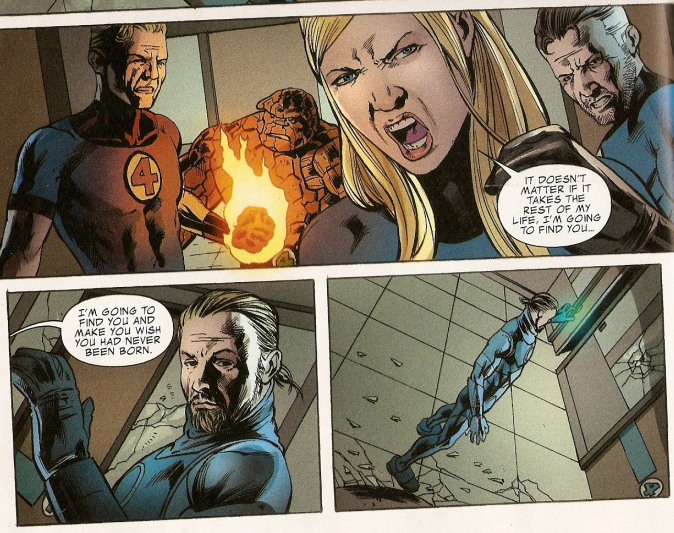
"I'm going to make you wish you had never been born" says Sue to Franklin.
Look at his face.
He's way past that stage.
...until the Great Reboot
The significance of the Great Reboot, particularly the cores
stories in Hickman's Fantastic Four (climaxing in issue 600) is
that Franklin is finally at peace with himself. For more about how
the Great Reboot unfolds, see
its own page.
At this point I should probably mention where Franklin got his name: he's named after his maternal grandfather. The original Franklin was unable to prevent the death of his wife, and blamed himself. He became an alcoholic, would not defend himself in court, and spent the rest of his life in jail, hating himself, while his children (Sue and Johnny) had to fend for themselves. Finally he was hated when he seemed to try and kill his family (it was an impostor), then he died trying to protect them.

That's Franklin's name and heritage. It's all there in Fantastic Four 31-32. Oh, and his middle name? From Benjamin Grimm. The guy who often hates himself after Reed created him, the one Reed can never help.
Franklin has multiple personalities. But unlike others with multiple personalities, he can have avatars at the same time, in different places. The kid has dream adventures (Tattletale), the confused repressed guilty teenager (Psi Lord), the good adult (avatar), the bad adult (Ego-spawn), the Franklin who kept Doom's world going, probably the Sentry, and so on. Ego spawn was created by Franklin in FF328 because Franklin saw his mother get angry at his uncle Johnny, and Franklin feared that the family would break up. So Franklin unconsciously possesses the mind of a local thug in an effort to remove this threat to his mother.
All of these personas come back together in Fantastic Force 17. Fantastic Force was a big Freudian message of guilt about Franklin trying to usurp his father and save, then unwillingly destroy, his mother.
Teenage Franklin was raised in another dimension to be a "guardian of the sacred timelines." His face develops scars when he's in imminent danger. They seem to reflect his psychological scars.
Since that time, the pressures of maintaining a fundamentally paradoxical universe have created more and more parallel realities, most notably the Ultimate series, bust also numerous alternate Marvel Universes expressed in various limited series. This seems to be causing a great deal of cognitive stress to Franklin: First, his hidden sister Valeria reappeared, at her correct Real Time age (born in the mid 1980s, she reappeared in the late 1990s as a teenager). And the only way to fix this was to use the Ultimate Nullifier to reboot her back into Sue's womb. Second, and soon after this event, Franklin found himself in Hell, and even when he got out he thought he was still there. Franklin's subconscious control of Marvel Time is causing him real problems.
This panel combines both sides of Franklin's existence: the multiple personalities and his power as "the great enemy of the omniversal order." Fans may complain that Franklin's stories are always limited and messed up. Be grateful! If Franklin ever got control over even a tiny part of his power then the tiniest error would mean the end of everything.

If Franklin controls everything, this includes alternate realities: For example, in Hickman's run, Reed interacts with many of the alternate reality versions of himself. If Franklin controls the situation with 'his' Reed, then he must control all those other Reeds as well. So it makes no sense to talk of alternate reality Franklins. But surely other Franklins must exist in these other universes? Yes, and other Franklins exist in this universe as well (EgoSpawn, Tattletale, etc.). These are all manifestations of the same Franklin.
The best comic for explaining Franklin's view of the world is the 1991 Phoenix mini-series. It shows how Franklin sees everything as a movie, with little difference between reality and fantasy, present and future.

Here we see Franklin seeing his future self being in love, in the Days of Future Past time line. Note the parallels with "Watchmen," where Dr Manhattan experiences time in a non-linear fashion.

If Franklin is unconsciously causing this, why does he appear surprised? The key word is "unconsciously." Franklin's conscious mind cannot cope with the scale and complexity of his power and multiple realities: that is why it all happens unconsciously. Note that Franklin can only "watch" it by imagining his family and friends are near, in a non-threatening context (a movie).

In a weird meta-commentary, this series was so accurate, so close to reality, that Franklin could not allow it to be finished. In our world the series was canceled before publication. Read about it in the excellent 'comic book legends' series.
In 1973 he should have been five and would normally start school. His mind wanted to reach out. He reached out, took in the whole universe, and almost destroyed it. Reed had to shut his mind down to save him and save the universe. (See FF circa issue 140)
In 1982 he feels his body changing As his mind warps reality he makes himself complete the process in minutes, becoming an adult, and is very confused (see FF245). Reed and Sue managed to turn the mental dampers back on, and he de-aged again.


Interestingly this moment when Franklin lost control was also the time when Marvel's stories started going somewhere, with real changes to characters. In the Fantastic Four, Johnny fell for Alicia, Ben left the team, the Baxter Building was destroyed, etc. Marvels' sales began to increase, and it was a second golden age. But with Franklin again in control, the other major changes are gradually retconned over the next few years. Everything is safe again.
Ripples through the multiverse
Franklin at puberty coincides with the major dimensional
disruption known as "Jaspers' Warp" or "Crooked World" (1982–1984,
when Franklin was 14-16). This was mainly noted by Captain
Britain, but spanned the multiverse and introduced a number of new
characters and concepts into the Marvel Universe.
The next major event is when Sue is expecting another baby. Note that the cosmic control rod loses its power when near the distortion area of the Negative Zone (see the climax of FF annual 6). Presumably Franklin is the same. Sue could not conceive another child until years she and Reed spent an extended time was in the Negative Zone, where Franklin's unconscious power is weakest.
A young child will naturally feel threatened by a new baby. So what happens? Franklin unconsciously transports the unborn child to a distant part of the universe (causing Sue to believe she has miscarried). The child, Valeria, grows up far away where Franklin does not feel threatened by her. He allows her to return when she is a teenager, and old enough to be a protective older sister and not a threat. None of this is malicious, it is all done on an unconscious level, reflecting a young child's hidden fears.
What about when Franklin would have become an adult? In the late 1980s he should have reached the age of 20 and reached full maturity. At that point, the age-suppressed Franklin again experiences a loss of control. This loss of control threatens the very fabric of the Marvel Universe. The only way to solve the problem is for Nathaniel (his grandfather) to take him completely out of this time stream and let him grow up normally, coming back as a teenager for a short time. (It's all there in FF 376). So it seems that Franklin could not completely miss out his
teenage years, and so he had to spend some time as the teenage
Psi-Lord before going back to the safety of young childhood again.
Psi-Lord grew up in the near-real-time MC2 universe.
Age 16 may also show evidence of Franklin's sexual awakening - see the comments to FF275.
When Franklin reached his early 20s (Real Time early 1990s) his biological clock seems to have taken over. He needed to father his own children. He produced an offspring, Hyperstorm, who represents Franklin's deepest fears of growing up. Hyperstorm has Franklin's reality changing ability, but without his sense of duty to care for the world, and without his deep repressive tendencies. So in Franklin's regular universe, Hyperstorm is a danger to all that exists. In the grown-up dimension Franklin is then killed by mutant hunting sentinels. This is all very Freudian, as noted below.
The battle with Hyperstorm seemed to distract Franklin, weakening his control over the Marvel Universe. So in the early 1990s stories in all the comics become more adolescent and obsessed with image. This culminates in a being called Onslaught who kidnaps Franklin and poses a real threat to Franklin's safe universe. Franklin's Marvel Time powers go into overdrive, creating another new, safe universe where everything can go back to how Franklin subconsciously thinks it should be.
By his late 20s most men focus on making their biggest contribution to the world. Franklin is no different. The greatest event of Franklin;s career is when he created a complete new universe to ave his world: the Heroes Reborn pocket universe.
(Source: The following is based on an idea by ddevlin on Bleeding Cool forums. Something similar was proposed back in 2006 on the now defunct comixfan.com.)
In their 30s, and especially when they hit 40, most men feel a need to prove themselves. Franklin was no different. His life had not turned out as he planned: the Marvel Universe had collapsed into chaos. He was confused after the Heroes Reborn and Heroes Return events, and felt trapped and directionless. He allowed himself to be trapped in hell (see Waid's run on the FF). Why did he allow this, when it was shown in Byrne's run that he could escape Hell with merely a thought? Clearly his psychological state was the real problem.
As further proof of this midlife crisis, long after Franklin was rescued from Hell he thought it was an illusion and that he was still there. Franklin lives in a world of multiple realities, where everything bends and distorts and everything routinely goes wrong, so that crazy scenario would seem normal to him.
How did Franklin's mid-life crisis manifest himself in the wider world that he controls? I'm glad you asked. A that moment a mysterious new being appeared in the remnants of the Marvel Universe, the most significant new Marvel comics character of the last ten years:

Teen Franklin has hound scars on his face, like Rachel. Rachel
has them because she was an Ahab hound for half her life (see the
1992 annuals featuring "Days of Future Present"). Denis De Freitas
explained in an email:
"The very first time readers technically saw Franklin Richards with his aforementioned scars was way back in 1987! Ever have the privilege of reading the now classic Power Pack #36 by Jon Bogdanove? It's a brilliant little story wherein the Mastermold, seeking to eradicate the fabled "twelve" future leaders of mutantkind, hunts down young Franklin, projecting him first as a teenaged warrior (Ultiman), then, as an older Silver Surfer-like being called "The Twelfth". Master Mold also states that no mutant will ever surpass Franklin's "off the scale" potential. No surprise there. =)"


But why does Franklin have the scars? Was he a hound of Ahab in
some way, like Rachel? This was never explained, according to the
experts on this
forum and this
one. Tom Brevoort (the writer who specified the hounds
teeth look) openly admits that he thinks his Fantastic Force book
was a mess. In the book "Comic Creators on the Fantastic Four" he
says they did everything wrong and the story was all over the
place. He dismissed it as a title where hurried or inexperienced
writers and editors learn what not to do. Here again life met art:
the chaos of Franklin's own title represented the chaos of Marvel
and the chaos of the
Marvel Universe in the 1990s. It could not be any other way.
Given that Franklin's title reflected real events we can expect
it to have its own weird continuity (reflecting real world
continuity). So it is still worth asking the question, where did
the hound scars come from? It all fits rather neatly into my master theory.
Franklin was a hound but did not know it: his Elsewhen hunting
status was basically as a hound. Not that Franklin is a servant of
Ahab, but Ahab, like the entire Marvel Universe, is unconsciously
acting out Franklin's psychosis. Ahab is where all the lines
converge, where Franklin can no longer cope, where it all ends in
chaos and death. In short, it all points to the Great Reboot (the
2010-2025 story told many times from different perspectives: Days
of Future Present, the mad celestial the Chaos War, the climax to
Hickman's Run, etc.)
Note that the first character to have something like hound scars was the Molecule Man. FF319 explains that he was a broken part of a cosmic cube, a being who controlled reality. Presumably the hound scars represent broken connections between things: so they are manifested both in a broken reality warper (Molecule Man and Franklin) and in beings designed to track others across dimensions.

A comics fan recently asked, why are there no good Franklin stories? The answer is simply because Franklin, unleashed, can do anything. He is the ultimate deus ex machina. So it is hard to think up any story where he can play a role without solving the problems all at once. The best Franklin stories would have to revolve around his dangerous mental state, his unconscious power, and his complex relationships. But that would require a writer of exceptional genius. Meanwhile, there are some very good Franklin stories where he is treated as just a kid. Many of the Power Pack stories are good. And "Franklin: Son of a Genius" (where Franklin looks and acts like Calvin, from Calvin and Hobbes) is excellent. Purists may argue that Son of a Genius is not canonical. I disagree. It is perfectly consistent with the other stories, when seen from a six year old's point of view. And thanks to Marvel Time, none of the other stories are particularly canonical either, so what's the problem?
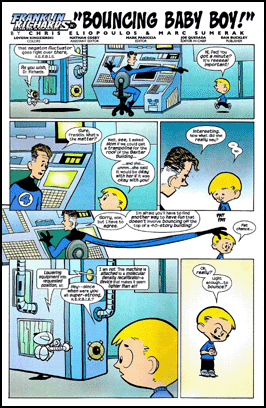
Apart from the "Franklin as kid" stories, writers don't know what to do with him. So come on Marvel, bite the bullet! Let Franklin grow up, and let comics grow up with him. Explore what he has really been doing for the past forty five years.
Come on Marvel, publish that story. You know it makes sense.
Franklin retcons anything he cannot handle. That includes his own age. Maybe this chart will help:
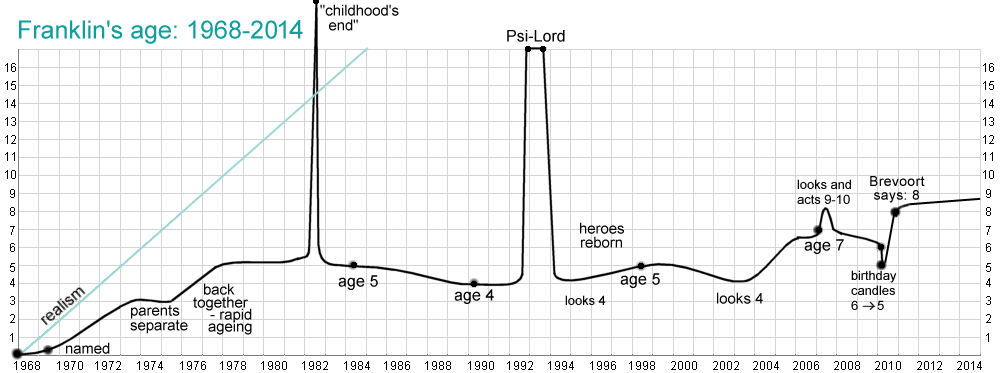
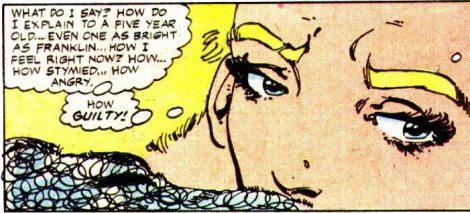
Fantastic Four issue 270, 1984: Franklin is five years old.

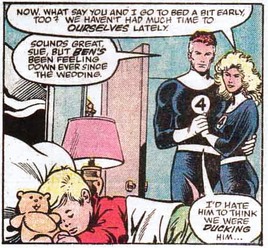
Fantastic Four issues 300 and 303, just before Englehart begins: his height, proportions and behavior suggests four years old or younger. Englehart accepts this and anchors Franklin's age at 4 when he starts to grow up again.
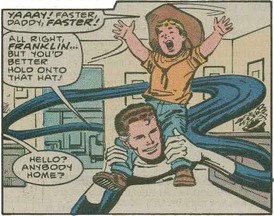
Englehart starts with issue 304, and true to his reputation he began time moving again. Franklin is happy again, so begins to grow. Alicia, who has been around Franklin almost constantly since issue 200, suddenly notices that he is growing up.
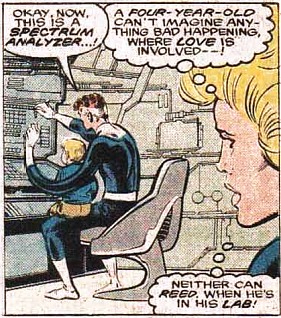
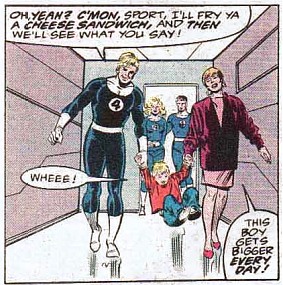
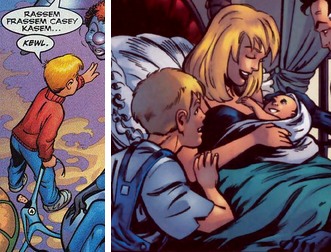
Franklin's aging stopped when continuity stopped in 321, and Franklin looks to be around five years old. At this period, "Son of a Genius" has him wearing a T-Shirt that says 4 1/2. The above image is at the birth of Valeria. Five year later Valeria looks to be four years old, but Franklin is only one year older. In 2010, according to Tom Brevoort, Valeria is two, but she looks a lot older in the comics.
Volume 3 issue 51: aged 7.

Volume 3 issue 60: still aged 7.

Marvel Knights 4 states that he is aged 8. (There is some disagreement over whether Knights is considered canon, but the consensus is that it is is.)

In 574 we apparently see Franklin de-age before our eyes. The family arranges a surprise birthday party. For a split second we see the cake before he does. It has six candles. In the next picture we see the number has gone down to five.
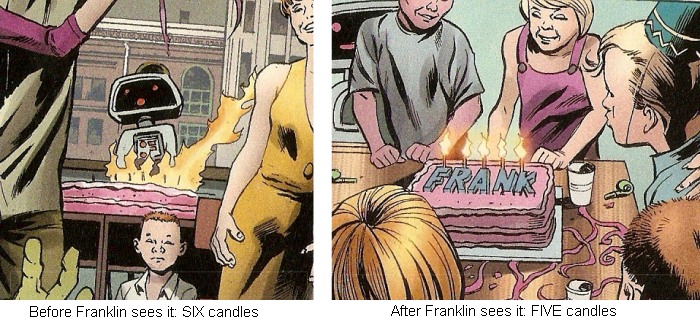
This birthday party is significant because the Power children are there. In the original Power Pack, Alex, the oldest, was 12 to 13 and Franklin was four or older. Johnathan Hickman, the writer of FF 574, stated that Alex is now aged 19. Which would make Franklin aged 11.
On 8th November 2010 on his Formspring account, Tom Brevoort
stated unequivocally that Franklin is eight. This was confirmed in
the letters page of Fantastic Four 5 (2013 series).
So now you know.
Franklin Benjamin Richards is justifiably scared of what he can
do. And that is why he never grows up.